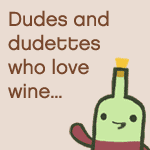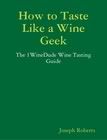 Excellence.
Excellence.
You deserve it. You demand it.
It haunts you. It drives you.
It's so Powerful. It makes you. Speak. In Broken. Sentences.
We're obsessed with comparing things when we make purchases, especially in the U.S. Some of us are always out there looking for the best. Even in today's excellence-obsessed status-quo-chasing society, no one can blame you for just honestly wanting to get the most bang for your buck when it comes to buying wine. Especially when the economy is in the financial out house.
This is where you'd think that wine ratings would help you. By rating a wine on a 100 point scale, you can make a quick shopping determination so that you can pick up the best bottle for the money, and feel confident that you got a good deal and will enjoy your purchase without having to learn any of that fancy wine mumbo-jumbo, right?
Not quite.
If I was grading the 100 point wine rating scale (hell, why not, we love to rate stuff, remember?), I'd give it a C-. That's because the 100 point scale has 3 major flaws that prevent it from really telling you what you think it should tell you...
Flaw #1: It's actually a 50-point scale.
Yes, just like those exams you took in grade school, no one actually gets less than a 50. A wine gets a 50 just for showing up and writing its name (on the label). This would lead you to believe that, like those old grade school exams, the 100 point scale grades wines objectively. Which leads us to...
Flaw #2: It gives a false sense of Objectivity.
No one can really score a wine 100% objectively. This is because we all have differences in our palates, and therefore (at least) subtle differences in how we interpret a wine's flavor and quality. If a particular critic gives a wine a very high score, it says nothing about whether or not you might like that wine. So, unless your palate and preferences are similar to that critic, if you blindly buy one wine over another just because it scored a few points higher, you may be passing up a great wine that you would enjoy even more than that flashy 'high-scorer'. Flaw #3: It implies a "Scale" of Excellence.
Flaw #3: It implies a "Scale" of Excellence.
Like that old grade school grading method, you'd expect a wine scoring in the 90s to be better than a wine scoring in the 70s (an 'A' vs a 'C') - and for the most part, you'd be right. But is a wine that scores a 95 "better" than a wine that scores a 91? This is much trickier territory. A difference of a few points does not guarantee that one wine is better than another, any more than my scoring a 95 and you scoring a 91 on a wine exam guarantees that I'd be a better sommelier than you.
The trouble is that too many people fall into the trap of following the numbers for their buying decisions - so much so that a wine rated a 90+ will sell for a much higher price than a wine that scored an 89.
In order to help break out of some of the rut caused by this scoring system, a group of wine bloggers has started up a new blog called The 89 Project. The aim of the 89 Project is to highlight the wines that people are missing out on because of the 100 point system. I've signed on as a contributor, so watch that space for an update from me (once I get my dirty little hands on some tasty "89s").
In the explanation of his 100 point rating scale, Robert Parker sounds his own word of caution about blindly following his (or anyone else's) scores:"No scoring system is perfect, but a system that provides for flexibility in scores, if applied by the same taster without prejudice, can quantify different levels of wine quality and provide the reader with one professional's judgment. However, there can never be any substitute for your own palate nor any better education than tasting the wine yourself."
Well said. Don't say we didn't warn ya!
Cheers!
(images: wales.nhs.uk, modmyprofile.com)
The Trouble With Wine Ratings (an Introduction to the 89 Project)
Related Articles (Sphere)
Vinted on
Thursday, July 31, 2008
Email This
![]()
Labels: 89 Project, best of, robert parker, wine review, wine tips
Subscribe to:
Post Comments (Atom)



























7 comments:
I think the biggest problem with the 100 point system is that it doesn't account for value. It's like each wine is judged on it's own irrespective of price. If wine A gets a 90 and costs 60 bucks, and wine B gets a 95 and only costs 10 bucks, are we really supposed to believe that wine B is hands down better? Then why would anyone ever buy wine A?
It seems as if people who use this scale are judging wine A versus other wines in that price range, but do they say that openly? No. And what's the point of only judging wines in the same price range against each other? I feel like someone knowledgeable about wines should be able to judge different prices against each other, so they could really tell you which wines were undervalued. So they might actually say that a wine that costs 15 bucks is better than a wine that costs 20. Isn't that what everyone wants from a wine recommendation? But the 100 point system isn't even designed to accomplish that.
Excellent points made by both Dude and Nick - in a blog I wrote just this week I liken the gulf between an 89 and 90 score to the old New Yorker cover where NYC takes up half the picture, and the rest of the world looking west just doesn't really matter. 90 would be the city and an 89 would likely be in the pacific ocean, far, far away...
90th Point blog
"a system that provides for flexibility in scores, if applied by the same taster without prejudice,"
Interesting quote from the Wine Advocate. It implies that the Advocate uses a "system". A "system" would be a methodology that when applied allows one to score attributes of a wine and then, after doing so, add up the score to see where it lands. Tasting a wine and then writing down a number from 75 to 100 based on an overall impression of how you are feeling about the wine at that time, is not a system; rather it is a whim. And were it actually a system with rules and methology, it would not prevent prejudice if it was applied by tasting wines in the cellar of the producer or with the label of the producer showing, or both. When there is neither a methodology nor an absence of prejudice, but there is an overt attempt to convince others that there is...it's called deception.
Hi WineDude! At the risk of you taking this the wrong way, I give your blog post a solid one hundred!
One thing I always wonder when reading the leading wine porn magazines (hey, I mean it in a nice way), is whether a 90 for a Merlot, for instance, does that mean a 90 compared to other Merlots or a 90 compared to every wine ever made? That may sound like word-splitting semantics to you, but I think that makes a big difference!
Thanks all! Great, great discussion going on here!!
One thing that is totally clear is that the 100 point system is totally unclear ;-)
First, let me say, I don't subscribe to any point scale for wine. It makes no more sense to me then ranking works of art on a point scale. Still, wine is a consumable and there are people who are paid to give consumers guidance in this area. As Steve said in one of his comments in the discussion based on his reaction to this post: "We can deplore our culture’s short attention span (and I do) and regret its reliance on symbols (which I do), but there it is..."
I guess the problem that we all have with the 100 point system is it perpetuates the notion that wine can be graded to this degree and that if you know nothing about wine and are faced with the burden of choosing between wines A,B, and C, your selection of wine B with a score of 92 over A and C, with scores of 90 and 91 respectively, will guarantee that you are choosing the "best" wine which we know is a load of crap.
On the other hand, debating wine rating methods can be sort of like debating left-brain vs. right-brain... I can imagine that faced with the task of distinguishing quality differences between 100s or 1000s of wines, most professional wine reviewers are going to resort to quantifying that somehow. The unfortunate side effect of this is that their quantifications affect the entire wine commerce system, from pricing to demand and back again.
That's why I think the 89 Point Project is a great idea and not "ridiculous" at all! The average consumer might be passing up some great wines (at outstanding values I might add) just because they are afraid of dipping their toe in the <90 pool.
Cheers!
Hi,
I'm Alisha from Wowzio, and I'm excited to tell you about our new widget platform that helps bloggers increase readership and create more engaged users.
I wanted to reach out to you to ask for your feedback on these widgets (feel free to also install them on your blog, if you feel they are a good fit).
You can check out widgets customized for your blog here:
Wowzio Widgets for your blog
I'm sorry for leaving this message via a comment, it's not at all our intent to spam you ( which is why i'm leaving this comment on an older post and you can always remove this comment ).
Again, we would love to hear your feedback.
Thanks,
Alisha Wright
alisha.wright1@gmail.com
Post a Comment